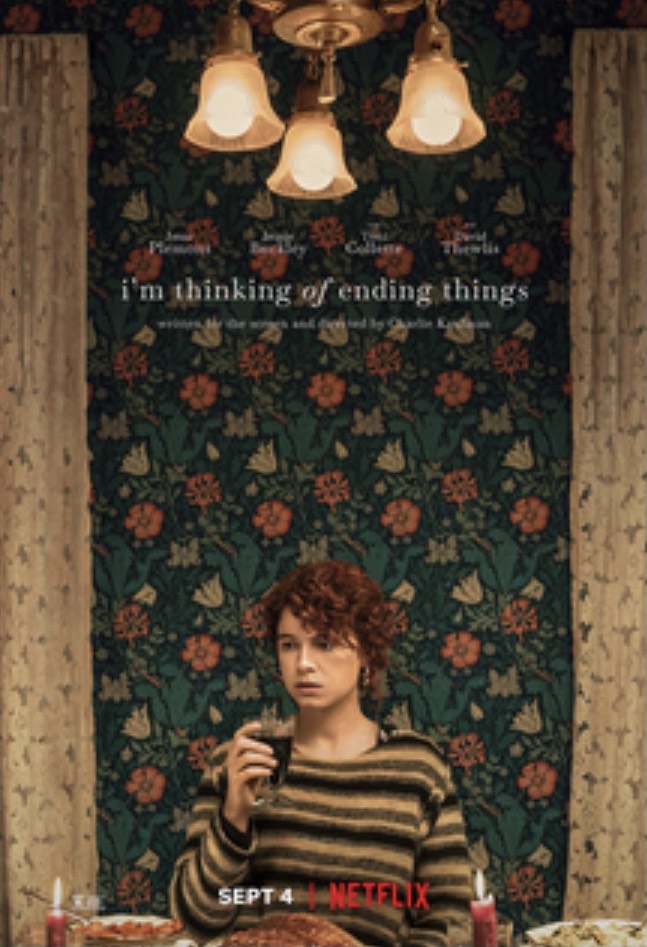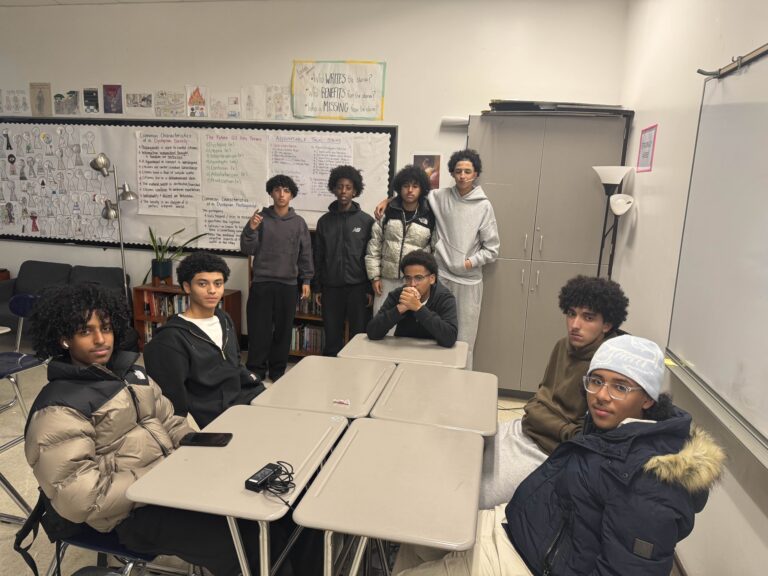
Official poster for the movie I'm Thinking of Ending Things. Photo from wikimedia.
Out of all the films I’ve watched this year, the one that I’ve since thought about the most is most certainly I’m Thinking Of Ending Things by Charlie Kaufman (who’s done Eternal Sunshine of the Spotless Mind and Being John Malkovich). It’s also debatable whether or not that’s a good or bad thing. After much thought, I can confidently say that I have not digested all of the ideas the film presented and most likely missed some of the more subtle themes. This is my current analysis and review of I’m Thinking Of Ending Things.
While it may seem unintuitive, I’ll get the more technical aspects of the film out of the way before I attempt to unravel the puzzle that is the plot. In terms of performances, they were all amazing; although this is the first piece I’ve ever seen Jesse Buckley in, she has already become one of my favorite actresses. Toni Collette sent chills down spine in all of her scenes, just like she did in Hereditary and Jesse Plemons does the same. The camerawork is usually simple, yet effective, although one scene towards the end is beautifully composed. It’s not revolutionary, but it gets the job done really well. Again, there’s probably more I’ll catch on another rewatch since I was really trying to figure out the themes and story more than anything on the first couple of viewings.
With that out of the way, I’ll dive into the rabbit hole that is I’m Thinking of Ending Things, from a story standpoint. The IMDb synopsis writes that “Full of misgivings, a young woman travels with her new boyfriend to his parents’ secluded farm. Upon arriving, she comes to question everything she thought she knew about him, and herself.” It leaves out the fact that throughout the film, her trip is intercut with scenes of a day in the life of a high school janitor. While the description isn’t wrong, it definitely won’t prepare you for actual viewing. In fact, I recommend you watch the film before going forward. It’s on Netflix, and it’s perfect for a quick watch late at night (don’t try watching it during the day, a sizeable chunk of the film is quite dark). This part of the review won’t make much sense without it. Skip to the end for my recommendation.
Did you watch it? Good. If not, keep reading I guess, but it’s going to be hard to follow. The first thing I’ll get out of the way that you probably didn’t pick up on is that Jesse Buckley’s nameless protagonist is a fantasy created by the janitor, who is also an aged Jake. I heard it was much easier to pick up on in the books, but there are still hints sprinkled throughout the film here and there. For example, Buckley’s paintings are actually Jake’s, if you saw that during her trip to the basement. Jake is also shown to have a love of film as we can see in his room, and Buckley’s character just happens to become a cinephile on the car ride home in her review of A Woman Under the Influence, which she viciously tore apart. The review was also lifted straight from the late critic Pauline Kael. It’s also one of my favorite scenes of the film, the way Buckley slips into her native accent so casually was amazing; I didn’t even notice the change at first. Finally, at the end of the film, she states that she never even spoke to Jake, he just stared at her in a creepy manner. She even said it was akin to describing “a mosquito that bit [her] 40 years ago. Jake is also hinted to be the janitor a few times, one of which was when she finds the uniform in the washing machine. The janitor also gives Buckley the slippers that Jake tried to give her earlier in the film. The girls at the Tulsey Town are also the same girls from the theatre who gave him weird looks.

So why is all of this important? What is Kaufman trying to say with this piece? Well for one, I know one of the biggest elements is the terror in aging. The most obvious sign of this is Jake’s mother, played by Toni Collete. Her performance is bone-chilling as I said earlier, and if you watched the film, you’d understand why; almost everything the mother does is unsettling in some way or leads to something unsettling. I didn’t quite put my finger on what was up with her, although I’m not too familiar with diseases or afflictions like the kind she had and I’m not in the place to diagnose someone. The way she pressed all the wrong buttons on Jake unintentionally made me cringe. In fact, throughout the entire dinner, I had to get up and take a break at least twice. Her laugh was tired, ominous, and sad all at the same time. Finally, the way this ties to aging can be fully wrapped up by examining her scene on the deathbed; it feels sad, but at the same time you could see it coming. It’s the same with age and death; it’s always on the horizon, and there’s no escape. Sometimes it’s swift, but oftentimes you know it’s coming a long time before it arrives.
Continuing on with the theme, but changing characters, the entire film is an examination of Jake’s psyche through Buckley’s eyes. We see his relationship with his parents, how it ended up, his regrets, and finally, we see dementia fully consume him. It’s extremely scary, seeing his regrets, what he wished he could’ve done, like approaching Buckely on trivia night or being able to spend more time with his mother or being able to be accepted by his father. Finally, his speech and song at the end in the theatre is something that I actually haven’t figure out. It’s definitely connected to aging (based on the audience) and his regrets (simply because this is the opposite of the life he lived), but there’s almost certainly more to dive into.
Finally, at the end we’re treated with a visual marvel; a dance scene featuring what seems to be Jake and Buckley, although they’re replaced by stand-ins. They live a life together, and right before they’re married, Jake’s doppelganger is killed by Jake’s other doppelganger, or more specifically, a stand-in for the Janitor. What does this mean? To be frank, I’m not entirely sure, but I’ll give it a stab. For one, we can assert that this is the life Jake wished he lived. However, right before they’re united in marriage, Jake is murdered by the janitor. Why? Probably because the life he ended up living is what kills this dream, and the murder is performed by the janitor because that’s who he ultimately ends up living as. There are probably other interpretations, and another watch may help me find more to it, but that’s how my view of the sequence stands as of the writings of this review.
Ultimately, I loved I’m Thinking of Ending Things. I don’t want to be that guy, but it really is a piece that makes you think really hard. While I think most of my assertions (or is it assertations?) on the piece are right, some bits like the dancing sequence, the thoughts on time and it’s true nature (which I didn’t dive into because they were extremely strange.) and the ending scene with Jake’s speech are all parts I’m unsure about. Which is fine by me; it means I’ll probably keep coming back to it and enjoy it. Even so, not everyone is the type of person who watches films for thematic reasons. Which is fine, not every piece has to be deep to make you feel something.
I’d recommend this piece to anyone who wants to have something to think about for a long time.




